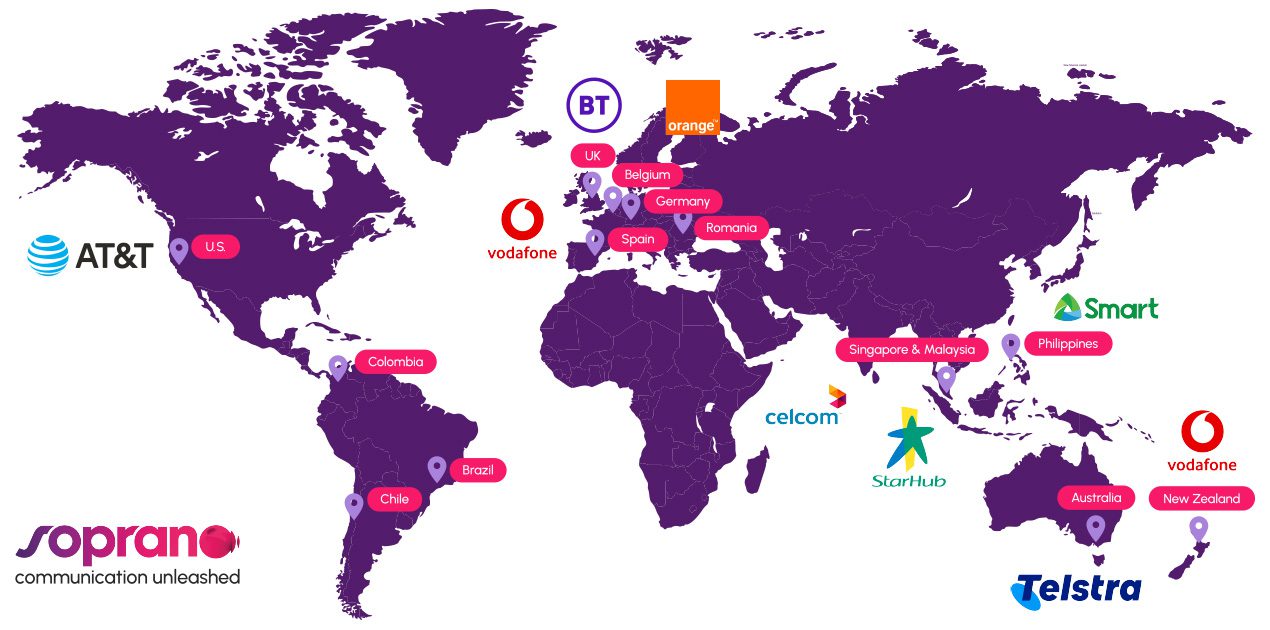using whatsApp for business communication
Learn everything you need to know to boost your business communication with WhatsApp.
Table of contents
WhatsApp goes beyond being an app for communicating daily with friends and family. With the creation of WhatsApp for Business, customers across different industries expect companies to have presence in their favourite app. This guide will explain all you need to know about WhatsApp for Business and how to implement it in your communication strategy.
WhatsApp has become the favourite mobile messaging app worldwide. With 2 billion users in over 180 countries, it is a must-have for enterprise communication because it allows engaging, supporting, and selling almost without limitations.
According to our research, 85% of smartphone owners prefer messages to calls or emails. If you are already using SMS, Email and Voice, it’s great. But it would be best if you empowered them with a more widespread, engaging, and easy-to-use channel like WhatsApp.
Using WhatsApp for business communication is a win-win for many reasons. Still, the most important is that it allows organisations to build relationships with their customers, employees, citizens, and patients by interacting with them in a super confidential and close way.
In a survey made in 2020 by WhatsApp, 75% of adults said they want to communicate with a business like they do with their family and friends. If your customers want you to be on WhatsApp, what are you waiting to start using it?
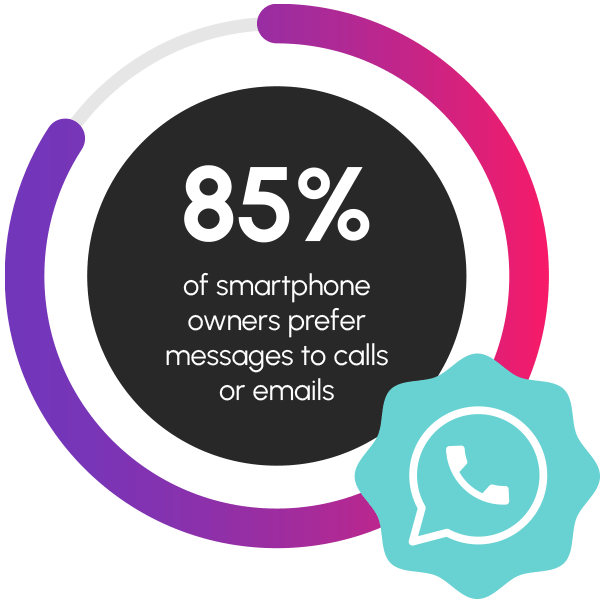
Long history short of WhatsApp
In 2009, WhatsApp changed how people communicated with each other. It was created by Brian Acton and Jan Koum, two ex-employees at Yahoo! – who saw a huge potential in the Iphone’s App Store.
Firstly, they wanted to build an app where users could show their statuses – “I’m studying” – “Boring”. The first version didn’t have much support. But, far from giving up, they continued making improvements.
Everything changed for WhatsApp when Apple launched the push notifications update to remind people to use their apps. WhatsApp’s developers took advantage of that update by sending notifications every time users changed their statuses.
iPhone users found it fun and started using WhatsApp to send and reply to their friends’ statuses. Over time, it became an internet-based instant messaging application.
What did people love about WhatsApp? It was super easy to log in – people could log in only with their mobile number and without the need for SMS plans.
A few years later, WhatsApp continued growing and launching versions for other smartphones. Its accessibility made it grow in popularity – No matter what smartphone you had or where you lived, you could use WhatsApp to chat with your loved ones.
WhatsApp was simple, secure, and reliable. A Brazilian doctor working in the US could talk with her family; a Spanish student doing a master’s in another country could stay in touch with his friends in real time.
Being able to reach somebody halfway across the world instantly, on a device that is always with you, was powerful
In the last ten years, WhatsApp has evolved from a simple alternative to SMS to a full-fledged app that supports videos, documents, photos, location, and voice calls. What’s more: it has no ads, gimmicks, or games. And it’s free.
But it was in 2018 when WhatsApp became a game-changer for businesses. By then, WhatsApp was fully encrypted and launched for Mac and Windows. The company – acquired by Facebook in 2014 – decided to go further and created WhatsApp Business.
The new version allowed businesses to create profiles, set up quick replies, and add links. Since its creation, WhatsApp for Business has become fundamental for small businesses to improve engagement and customer experience.
While customers’ expectations constantly change, providing them with what they want is essential. In this scenario, WhatsApp is great for companies because it’s their customers’ favourite app, has many great features, and means immediacy.
It has grown so fast that now WhatsApp for Business has more than 50 million users. But what about large companies? Here is when the API comes in.
WhatsApp Business App vs WhatsApp Business API
As expected, WhatsApp did not stop with its first version of WhatsApp for Business. While it was perfect for small businesses, medium and big companies needed more, such as automation, more volume of messages and multi-users.
WhatsApp Business API was explicitly created for large enterprises that wanted to use WhatsApp for their marketing and communication strategies. With the API, businesses can integrate WhatsApp into their IT systems or CMR to send and receive massive notifications.
The main difference is that WhatsApp Business API has more features and extended functionalities, like the possibility to add chatbots, send a massive volume of messages and provide customer support 24/7.
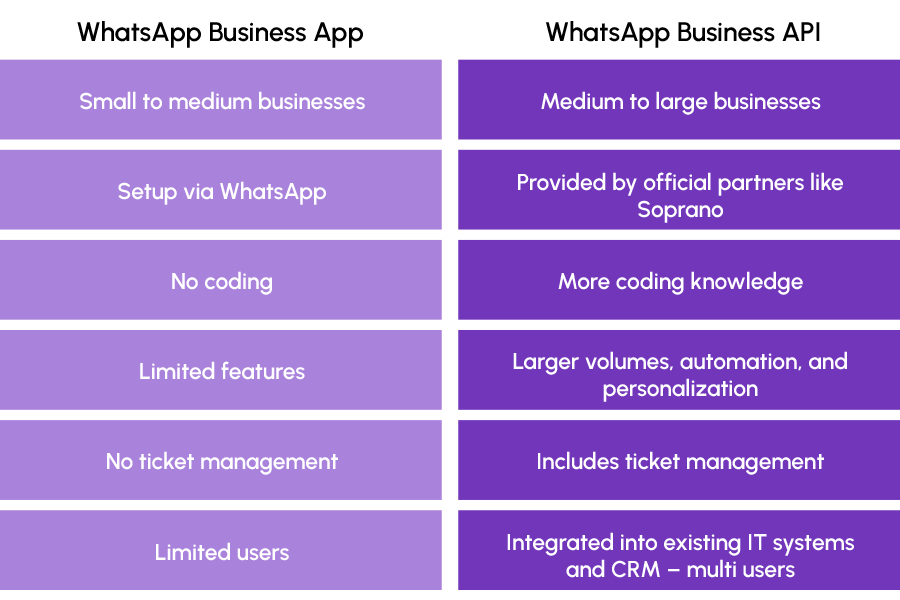
WhatsApp for Business improves your Customer Experience
Customers matter experiences. When looking for a product or service, people evaluate the holly experience they have from the start of the research until they finally decide to buy.
According to our WhatsApp for Business infographic, 86% of consumers would buy again after a good customer experience vs only 13% who would buy again after a poor customer experience.
In this scenario, how businesses interact and support their clients and potential customers is fundamental. Customer experience is not just about offering a good product or service; it’s about gaining customer loyalty by finding ways to engage and be where your clients are.
According to Hubspot, 64% of people think customer experience is more important than price in choosing a particular brand.
WhatsApp for Business adds value to enterprise communication. The favourite mobile messaging app – it has over 2 billion users in 180 countries – is interactive, secure, and scalable.
Via WhatsApp, enterprises can send images, files, catalogues, links, and more. Thanks to AI automation, it also allows using chatbots and automatic responses to address customers’ inquiries 24/7.
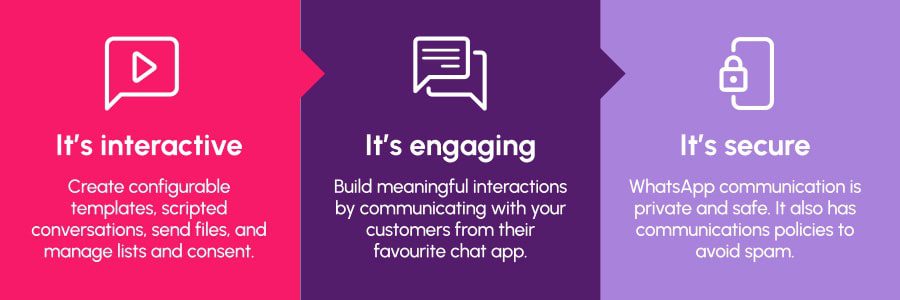
Benefits of WhatsApp for Business
There are many mobile messaging channels to communicate with customers. While each has pros and cons, WhatsApp stands out for some benefits that make it unique and super engaging. Let’s look at them in detail.
WhatsApp is here to stay
Since its creation, WhatsApp has never stopped growing. In April 2013, WhatsApp only had 200 million users. According to Statista, the number escalated to 2 billion in March 2020.The exponential growth of WhatsApp users worldwide demonstrates that it continues positioning itself as a fundamental part of our daily communication.As we mentioned in the history of WhatsApp, the company is continuously updating the product and looking for new ways to engage and give the users what they want, such as groups, stickers, video calls, and statuses.
It is easy to use and has so many features that people also want to use it to chat with businesses. According to WhatsApp research, people prefer to communicate with companies by message for help and are more likely to make a purchase when they can make questions in real-time.
More than 175 million people message a WhatsApp Business account every day.
WhatsApp is genuinely engaging and actionable
Unlike SMS, WhatsApp allows rich media content that makes more attractive customer experiences. Sending only a short text can be impersonal, but it can be completely different with emojis, files and links.
Our WhatsApp API allows businesses to add videos, files, images, links, emojis, maps, and more to their WhatsApp messages. These types of engaging messages invite customers to act and see results.
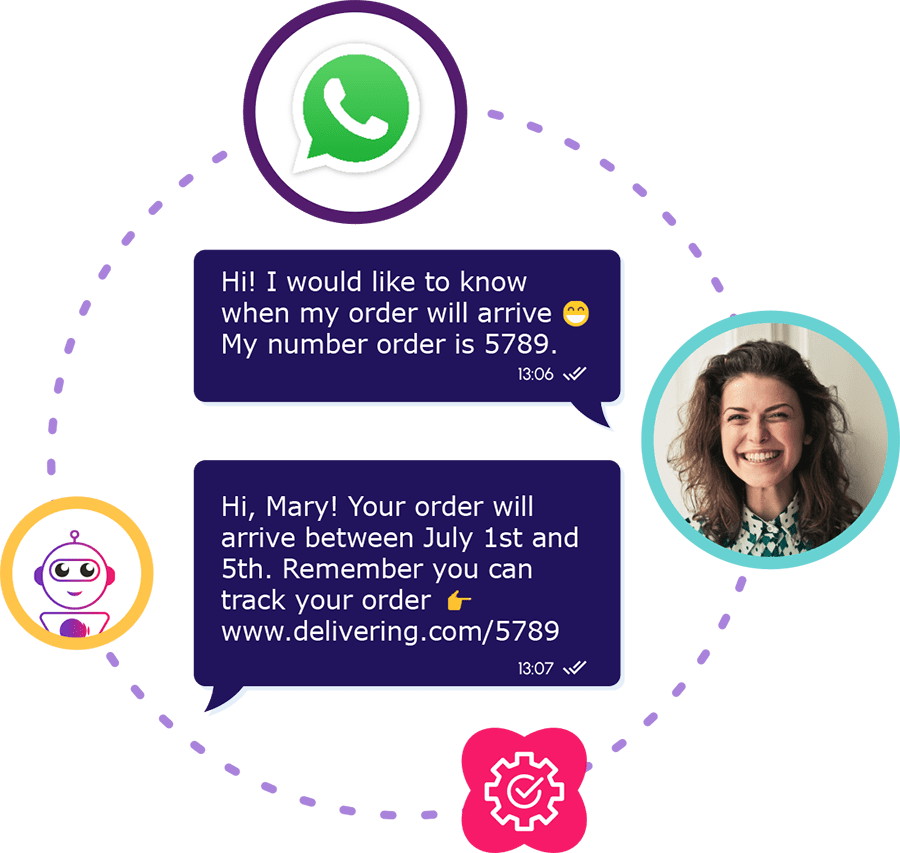
The two-way conversation is one of the characteristics that makes WhatsApp so unique and effective. And thanks to automation, there is no need to have live agents responding to customers 24/7.
AI chatbots can understand customers’ needs and try to solve their enquiries. Thus, you can be available whenever they want you without overloading your staff.
82% of customers expect an inmmediate response to their enquiries
Customers want businesses to be on WhatsApp
Over 2 billion people use WhatsApp to communicate with their friends and family daily because it is fast, simple, and convenient. Well, they want the same for communicating with businesses.
In this fast-paced world, people don’t want to download any businesses’ individual app, call or go to the physical store. They want to interact with brands in the channels they are already using.
A 2020 report states that 85% of consumers surveyed want to message brands directly. Well, nothing better to have the possibility to interact with them than the app most used worldwide.
According to Will Cathcart, CEO of WhatsApp, 175 million people send messages to WhatsApps’ business accounts daily.

WhatsApp for Business use cases
Now that you are convinced to use WhatsApp for your marketing and communication strategy, you are probably wondering: “How can I use WhatsApp?”. We have good news because WhatsApp has many valuable and practical use cases.
Besides using WhatsApp for customer service, businesses usually choose WhatsApp for sending essential notifications such as:
- Confirmations: Sometimes, we need users to confirm an action they have requested, for example, a purchase.
- One-time passwords (OTP): WhatsApp is a secure system for sending one-time passwords to users.
- Appointment reminders: WhatsApp is an unbeatable channel to send appointment reminders and allow users to confirm, cancel or reschedule them.
- Order delivery status updates: You can keep your customers updated about their orders and give them the possibility to respond if they have any additional questions or want to make a change.
- Problem resolution notifications: If your users are waiting for a solution to a problem, you can send them a WhatsApp message once it’s solved.
- Schedule changes: Due to its immediacy, WhatsApp is an excellent channel to communicate last-minute schedule changes, for example, for events, appointments, bookings, and more.
- Booking confirmations and updates: Send any information regarding orders, bookings, and updates via WhatsApp. Allow your customers to interact with you if they have any questions.
- Security alerts and delay notifications: If an unforeseen event occurs or a security alert goes off, you can instantly send a message through WhatsApp and be assured that they will read it in a short period of time.
- Payment updates and reminders: Use WhatsApp for any transaction updates and payment reminders you want to send to your customers.
- Emergency alerts: If an emergency occurs, you can send a WhatsApp message with an emergency plan document, video or image to explain what to do.
Best of all, these use cases are helpful for different industries. For example, the banking industry can send operation notifications and one-time passwords; the healthcare industry uses it a lot for appointment reminders, and retailers take huge advantage of WhatsApp by sending purchase confirmations and package delivery statuses.
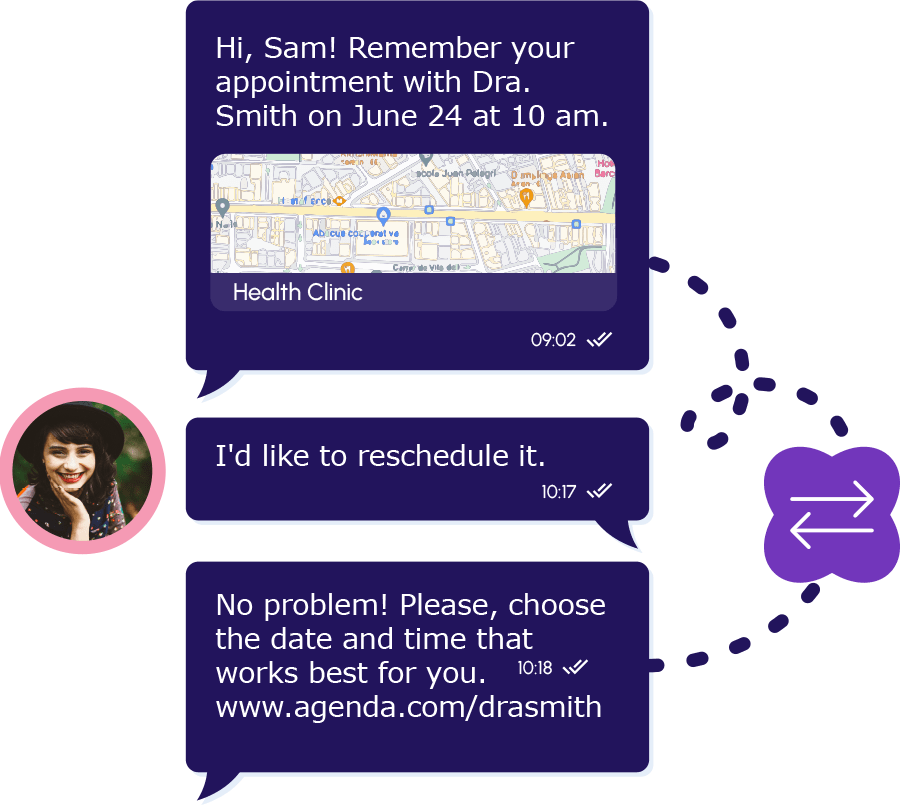
But what do customers want? According to research, 50% of interviewed persons preferred WhatsApp for scheduling appointments, and 43% wanted to receive appointment and booking confirmations and updates.
In addition, WhatsApp allows two-way communication with the user, which helps you obtain interesting data.
- Confirm, cancel or reschedule appointments: The user can contact you via WhatsApp to communicate any changes that need to be scheduled.
- Conducting customer satisfaction surveys: You can send personalized surveys to get your customers’ feedback and make improvements.
- General customer service: Customers can contact you about other doubts or questions they may have and receive the correct response almost immediately.
- Questions about the status of customer service tickets: If the user has opened a ticket with the company, you can follow up and consult their doubts.
- Questions about the delivery status of packages: If users are waiting for a package, they will be able to monitor and ask about its status.
Why Soprano is the one of the best WhatsApp for Business partner?
To take your communication strategy to the next level, you should start using WhatsApp for Business. We have good news for you! With Soprano, WhatsApp integration is effortless.
Soprano is an official WhatsApp API provider – our CPaaS Platform offers low-code no-code communications APIs to allow large enterprises and businesses to achieve a rapid integration to your business’ CRM or apps without additional development work.
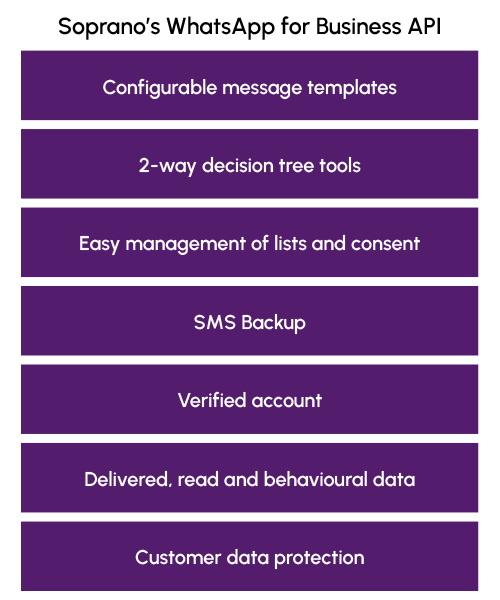
With Soprano, you can open a new world of interactions by linking chatbots to WhatsApp, creating bi-directional interactions and initiating a business to end-user conversations.
Our predefined templates allow you to deliver consistent messages to your customers, always with the security that they are encrypted.
If you use other mobile communication channels and want to provide an omnichannel experience, you can use WhatsApp as a secondary channel. For example, you can send important notifications via SMS and then contact via WhatsApp to strengthen your message.
Unlike SMS, with WhatsApp for Business API, you can check real-time delivered, read and behavioural data to confirm if your audience has seen your message.
Ready to unlock a new world of interactions? Please find out more about what our WhatsApp API can do for your business.
